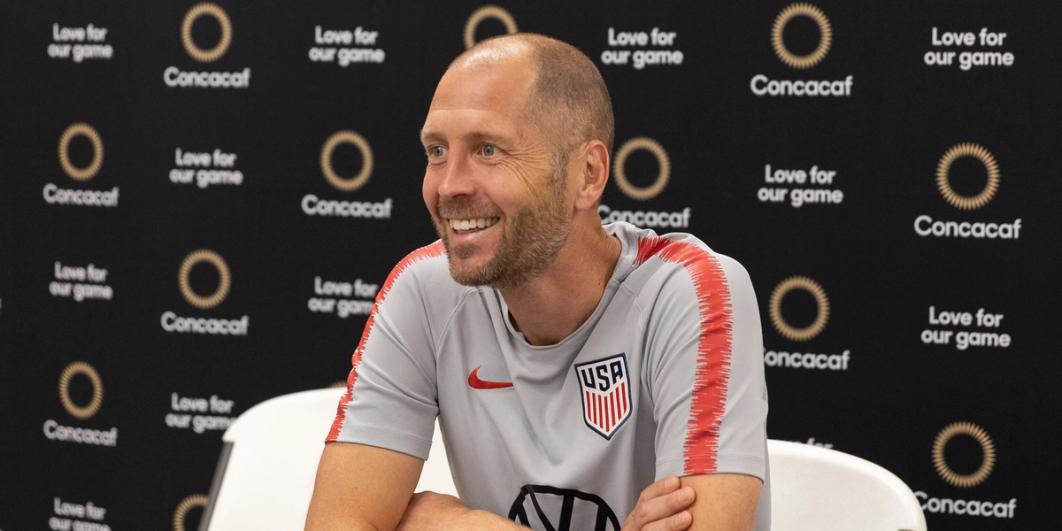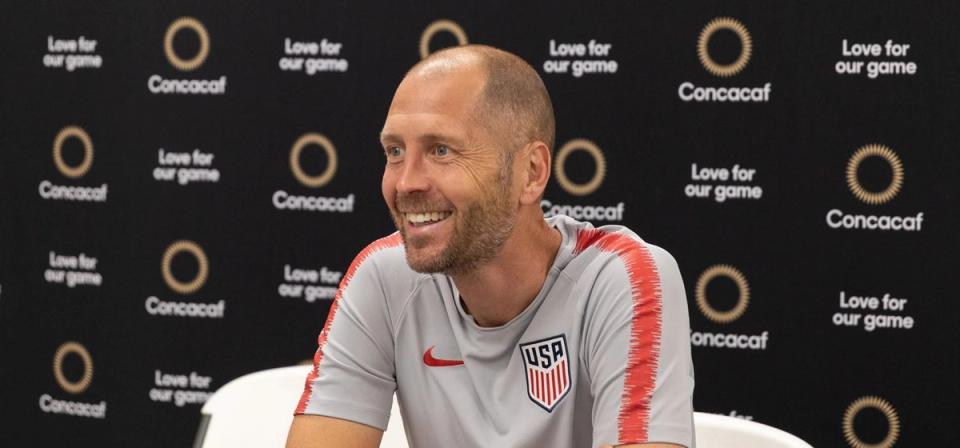Q&A: Gregg Berhalter Discusses 2021 Concacaf Gold Cup Draw
USMNT head coach address his team's draw and the busy schedule ahead in 2021



After learning the U.S. Men’s National Team would be grouped with Canada, Martinique and a third to-be-determined opponent in the 2021 Concacaf Gold Cup, USMNT head coach Gregg Berhalter addressed the media on the busy year ahead for his squad.
With the Gold Cup, Concacaf Nations League, the start of World Cup Qualifying and potentially the U-23 MNT at the Olympics next summer, how are you planning to juggle all of these competitions next year?
“There are a lot of competitions, and what that means is that it’s an opportunity for players. It’s an opportunity for them to show they belong, that they should be part of the first team. No matter what competition we’re in, every time the players step on the field they prove that they can wear the jersey, that they can be part of the group, the squad, whatever that may be.
“The Concacaf Gold Cup represents the premier tournament in our confederation and it’s a chance to win a trophy. This is a young team that hasn’t won a trophy yet, so we’re certainly going to be trying to accomplish that in this tournament.”
How are you planning to deal with clubs and players to get them in for all the different competitions next year?
“It’s going to be about the communication. It’s going to be looking at a lot of different players. It’s going to be juggling some players in certain cases. Next year represents the chance to win two trophies with the Nations League and the Concacaf Gold Cup and then to get a really good start in qualifying. It looks like we’re going to be playing eight games of qualifying in 2021. That’s a big chunk of games where we can make a dent and start to reach some of our goals in qualifying for the World Cup.”
How difficult is it going to get players released from their clubs for the different competitions?
“The clubs are obligated to release the players for this event. That’s part of it. Whenever the release date is – it may be June 28 – the clubs are obligated to release the players. To us this represents more than that. It represents relationships, and we’re in communication and really talking to the clubs and trying to piece together what makes the most sense for the player.
“If I asked you is it reasonable for a player to play a whole season, then go to the Nations League, then go to Gold Cup, then start preseason again without a break, it’s probably not reasonable for that. We’re going to have to juggle the squad a little bit – we’ll still be competing for trophies – but there will be a certain amount of juggling that we need to do.”
Did the shift in schedule where the Nations League was moved to June and moving the start of World Cup qualifying from before the Gold Cup to after the Gold Cup change your calculus about how you wanted to use the Gold Cup?
“When you think about getting the whole group together, we’ll have an opportunity in March to do that, we’ll have an opportunity in June to do that and then the Gold Cup could be an opportunity and then it’s qualifiers. Either way it’s still looking at the player’s workload and their schedule. We have to be mindful of that – that’s really important in this whole process. We certainly want to get our group together -- we want to get our group playing together before qualifying.”
If the U-23 MNT does qualify for the Olympics, how do you balance guys who are trying to fight into the senior team and could use the Gold Cup as a place to prove themselves for World Cup Qualifying?
“It’s not cut and dry. It’s not clear. You talk about an opportunity for a young player to go to the Olympics and compete for a medal, it’s a tremendous honor. It happens every four years. It’s going to come down to working really closely with [U-23 MNT head coach] Jason Kreis, looking at our player pool, looking at the workload of the guys and trying to make the best decision possible. We won’t get everyone right, I know that, but by and large we want to make really good decisions to make sure every team has the opportunity to win a trophy and that we’re also being mindful of what the players have been doing.”
Does it feel odd to think about how long it’s been since the USMNT has been together and the uncertainty that comes with this time period?
“Part of the uncertainty is what we’re dealing with in our everyday lives. Nothing feels certain anymore. That’s just something we have to adapt to, we have to be flexible, we have to make the best possible decisions with the information we have and we have to play. When we plan, if something doesn’t go our way, we have to use an alternate plan and keep going.
“It is challenging for international managers right now – the lack of playing time. It’s great to see Europe back playing internationally, hopefully South America will get going also. World soccer has to restart again, and we need to look for ways to do that. We’re doing that now.”
How is your coaching staff functioning right now?
“As a staff we’re in the office twice a week – Wednesday and Thursday, but Monday is used for scouting individually. We’re all assigned to watch players – we have a ton of players in MLS, a ton of players in Europe – all playing and we’re watching them carefully.
“Tuesday is when we have a call and we recap all the performances of the players. We have a scouting platform that we use to do that and they’re all evaluated. Wednesday, Thursday we’re in the office and working on our game model type of things, working on watching opponents, watching phases of play of other teams, just getting deep into soccer. Then Friday we have another call to end the week. On the weekend we’re watching games again.
“It’s a cycle where you would like to have the tension of preparing for an opponent, preparing a team to play and picking a squad, but unfortunately we don’t have that at the moment, so we have to make the best of it.”
With the extra time you have, how is your approach to coaching evolving?
“It’s challenging. You’ve become a coach in theory now and not in reality. That’s the challenging part of it. It’s about studying now, watching trends of the game, watching what teams are doing, watching our players really carefully. You can still be productive, but we’re not getting the reps on the field and we’re not getting the game reps.
“In terms of studying the game, you can still do that with plenty of video. I think the most important thing is still keeping current on our player pool and knowing exactly what they have been doing.”
With a compact schedule, we’re seeing more young players get valuable minutes this season in MLS. Who has caught your eye?
“With these opportunities, these players are going to be faced with challenges that they’re going to have to rise to or succumb to. You see a lot of players rising to the occasion and rising to the challenges. It wasn’t that common that such young players were playing in MLS.
“You look at Moses Nyeman from D.C. United, you look at Kevin Paredes, Griffin Yow. Those are good examples of young players making a good impact in the league.
“Other players as well. Brenden Aaronson obviously is an established player at his age and Mark McKenzie’s been doing a fantastic job. So, it’s just for us keeping track of these guys. The player pool that we’re scouting right now is expanded and we want to make sure we’re getting every guy who has an opportunity to play. It’s just been fun to watch them.”
Canada head coach John Herdman said the Nations League games last fall helped ignite the rivalry between the USMNT and Canada. How do you see the rivalry that is developing with Canada?
“The thing is, even prior to the game in Canada [last October], I was saying to the media that this is a very good generation of players that they have. It’s a really good time for Canadian football. Alphonso Davies is obviously spearheading that effort, but then you look at Jonathan David who is a nice young player, you look at Lucas Cavallini who’s an excellent player, you look at Richie Laryea and what he’s been doing, you look at Scott Arfeld who is a really good soccer player and you look at Jonathan Osorio, Mark-Anthony Kaye is an excellent player. It’s a really good team, but I’ve said that all along.
“They have talent. For them it’s about putting it together and competing as a team. They’ve been shown to be making progress on that. They were two challenging games when we played them. They kicked our butt up in Toronto and we beat them pretty good in Orlando, and we’re looking forward to playing them in the Gold Cup, because we know it’s going to be a really competitive game.”